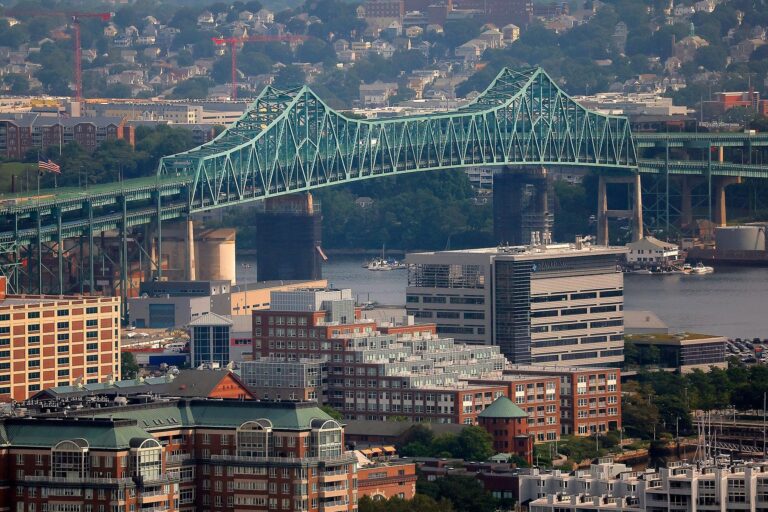The Tobin Bridge, a critical transportation artery in the region, is undergoing important updates as part of a broader initiative to enhance major state infrastructure projects. This comprehensive effort aims to address pressing maintenance needs, improve safety standards, and accommodate increasing traffic demands. State officials have outlined plans that underscore the importance of these projects in boosting economic growth and ensuring long-term durability of key transit routes. As work proceeds, commuters and residents alike are watching closely for the impacts and benefits these developments will bring.
Table of Contents
- Tobin Bridge Renovation Progress and Timeline Analysis
- Impact of Tobin Bridge Upgrades on Local Traffic and Commuters
- State Infrastructure Projects Boosting Economic Growth Across the Region
- Recommendations for Enhancing Project Efficiency and Community Engagement
- Closing Remarks
Tobin Bridge Renovation Progress and Timeline Analysis
Significant milestones have been reached in the ongoing Tobin Bridge renovation, with crews completing critical structural repairs ahead of schedule.The phased approach has allowed for minimal disruption to daily commutes, as work progresses primarily during off-peak hours. Recent updates highlight:
- Completion of corrosion mitigation on steel elements
- Installation of new safety barriers and pedestrian walkways
- Upgrade of bridge lighting to energy-efficient LEDs
These improvements not only enhance safety but also extend the lifespan of the vital infrastructure, ensuring smoother transit across Boston’s key artery.
The project timeline projects full completion by late 2026, with quarterly progress reports confirming adherence to established deadlines. Officials continue to monitor weather impacts and supply chain variables closely, adjusting schedules as necessary to maintain momentum. Community engagement efforts remain active, offering openness through public briefings and detailed online updates. Key upcoming phases include:
- Deck resurfacing expected to begin spring 2025
- Final structural reinforcements slated for early 2026
- Comprehensive safety testing preceding reopening
This methodical approach underlines a commitment to both efficiency and public safety as the Tobin Bridge nears a transformative upgrade.
Impact of Tobin Bridge Upgrades on Local Traffic and Commuters
The extensive upgrades to the Tobin Bridge have led to a noticeable shift in traffic patterns across surrounding neighborhoods. Commuters have reported reduced travel times during peak hours, as improved lane configurations and state-of-the-art traffic management systems streamline vehicle flow. Though, intermittent lane closures and construction-related detours have caused localized congestion, prompting city officials to advise alternative routes and flexible commuting hours.
Key changes influencing daily travel include:
- Enhanced ramp access reducing bottlenecks during the morning rush
- Upgraded lighting and signage improving safety and visibility at night
- Deployment of smart traffic signals to better manage traffic volume fluctuations
While some delays persist due to ongoing work, early feedback from local commuters highlights a broadly positive impact reinforcing hopes that the completed project will foster smoother, more reliable transit across this critical artery.
State Infrastructure Projects Boosting Economic Growth Across the Region
MassDOT’s ongoing strategic planning for the Tobin Bridge reflects a broader commitment to infrastructure modernization that is set to invigorate the regional economy. The Long-Term Strategic Planning Study is actively exploring innovative replacements, including the possibility of a tunnel, aiming to enhance connectivity between Chelsea and Boston’s Charlestown neighborhood. This modernization drive promises to relieve congestion, improve traffic flow, and support a more resilient transportation network, crucial for sustaining economic momentum in Greater Boston.
Beyond the Tobin Bridge, state officials are aligning multiple infrastructure projects to stimulate growth. These initiatives focus on:
- Upgrading aging bridges and highways to meet modern safety and capacity standards
- Incorporating climate-resilient designs to future-proof critical transportation assets
- Enhancing public transit infrastructure to boost commuter efficiency and environmental sustainability
Coordinated investments in these areas are expected to generate new job opportunities, attract businesses, and strengthen regional competitiveness for decades to come.
Recommendations for Enhancing Project Efficiency and Community Engagement
To optimize the timelines and budget adherence of ongoing infrastructure projects like the Tobin Bridge refurbishment, leveraging advanced project management technologies is essential. Incorporating real-time data analytics and AI-driven predictive tools can streamline resource allocation and foresee potential bottlenecks before they materialize. Additionally, fostering cross-agency collaboration encourages the sharing of best practices and innovation, driving efficiency gains across all state initiatives.
Engaging local communities early and consistently remains a cornerstone for prosperous project implementation. Transparent dialog through public forums, digital platforms, and interactive workshops can cultivate trust and gather valuable feedback. Recommended strategies include:
- Regular progress updates via social media and dedicated web portals
- Inclusive stakeholder meetings that accommodate diverse schedules and languages
- Community liaison officers serving as direct points of contact
Such efforts not only mitigate disruptions but also empower residents to contribute to shaping infrastructure that directly affects their daily lives.
Closing Remarks
As the Tobin Bridge continues to serve as a vital artery for commuters between Chelsea and Boston, Massachusetts Department of Transportation’s ongoing efforts-from extensive repairs to eventual replacement plans-underscore a commitment to maintaining and modernizing essential infrastructure. With initiatives aimed at mitigating resident impact amid construction and significant contracts awarded for bridge rehabilitation, the state is navigating both immediate needs and long-term solutions. These projects not only enhance transportation safety and efficiency but also reflect a broader push to strengthen Massachusetts’ infrastructure for the future. Stakeholders and commuters alike will be watching closely as these developments progress, shaping the region’s connectivity for decades to come.
For more details on the Tobin Bridge mitigation programs and forthcoming replacement plans, visit the full reports by MassDOT and local news outlets [[1]](https://whdh.com/news/massdot-launches-program-to-provide-relief-to-residents-amid-tobin-bridge-project/), [[2]](https://www.nbcboston.com/news/local/massdot-begins-planning-for-eventual-replacement-of-tobin-bridge/3141568/),[[3]](https://www.boston25news.com/news/local/state-setting-sights-replacing-bostons-tobin-bridge-massdot-approves-109-million-repairs/54DHALJ3Z5ARPFDIGB3NRQ4PMA/).

